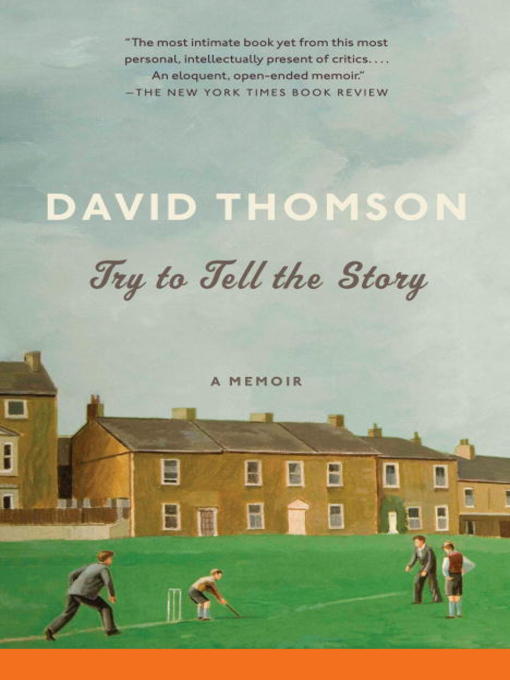
Try to Tell the Story
A Memoir
کتاب های مرتبط
- اطلاعات
- نقد و بررسی
- دیدگاه کاربران
نقد و بررسی

November 3, 2008
Film historian and novelist Thomson (The New Biographical Dictionary of Film
; Suspects
) looks back at his childhood and teen years, beginning with hazy memories of frosty mornings, air-raid shelters in wartime London, fear of bombs and the evacuation of children to the countryside. When the war ended, boys played in bombed-out buildings where staircases stopped in midair: “The living rooms were exposed to the night air, but sometimes suggested that the residents had just left for the moment, like stage sets waiting for the next act.” An only child born in 1941, Thomson talked with an imaginary sister, Sally, as he progressed from reading comic books to listening to BBC dramatizations on the “matchless medium” of radio. Probing personal defeats and triumphs, he reflects on his four years of speech therapy: “Stammering is a silly little thing. It won't kill you, but it'll change the course of your life.” In the heart of this haunting, eloquent memoir, as might be expected, he gets rhapsodic when recalling the films that left an indelible impression on him: Red River
, Meet Me in St. Louis
, Citizen Kane
, East of Eden
. While following a film critic in the making, we also see the changing cultural landscape of the 1940s and 1950s through his eyes.

February 1, 2009
Prolific San Francisco-based film critic and historian Thomson has written some 20 books, including biographies of such diverse luminaries as Orson Welles ("Rosebud"), Nicole Kidman, and überproducer David O. Selznick ("Showman"). He is perhaps as well known for his "Biographical Dictionary of Film" and its updated version. In his memoir, Thomson largely focuses on his childhood. Born in 1941, when German bombs were still raining down upon his home city of London, he lived with his mother, grandmother, and a father, often absent, whose open approval he sought but rarely received. His dad, a sometime amateur actor, did pass on a love of the theater that later became a passion for the cinema. Thomson gradually realized that his father had been in a longtime relationship with a much younger woman and had a parallel life elsewhere. Thomson ends his somewhat bittersweet memoir around the time he is admitted to university. Because of the book's intensely personal nature, its interest will probably be limited to those familiar with Thomson's work. Recommended for inclusive collections.Roy Liebman, Los Angeles P.L.
Copyright 2009 Library Journal, LLC Used with permission.

Starred review from December 15, 2008
Thomson, one of the most erudite critics and historians of film working today, here recalls his mid-1940s and 1950s London childhood. Unsurprisingly, the love of cinema permeates every page. He evocatively describes the bleak conditions of life in the World War IItorn capital, in which he, an only child, played amid bombed-out buildings, oblivious to the debris; and he examines his complicated relationship with an emotionally distant father. He often discusses the austere conditions with gentle humor. For instance, he first discovered bananas by watching American movie stars slipping on their peels and then asking his grandmother, Whats that? The movies captivated him. The cinema and the grand palaces in which they were shown represented another world, much more vivid than life. As a child, he couldnt separate the terms in America from in the movies; to his young mind, they were one and the same. Growing up, he liked westerns (especially Red River) and adventure films, but he admits, I would take anything. Later, he discovered the National Film Theatre, where he was introduced to the films of Ingmar Bergman, and decided to enroll at the fledgling London School of Film Techniqueat the time the only such school in Britainrather than Oxford, much to the disappointment of his teachers. Thoughtful, honest, and engrossing.(Reprinted with permission of Booklist, copyright 2008, American Library Association.)

























دیدگاه کاربران